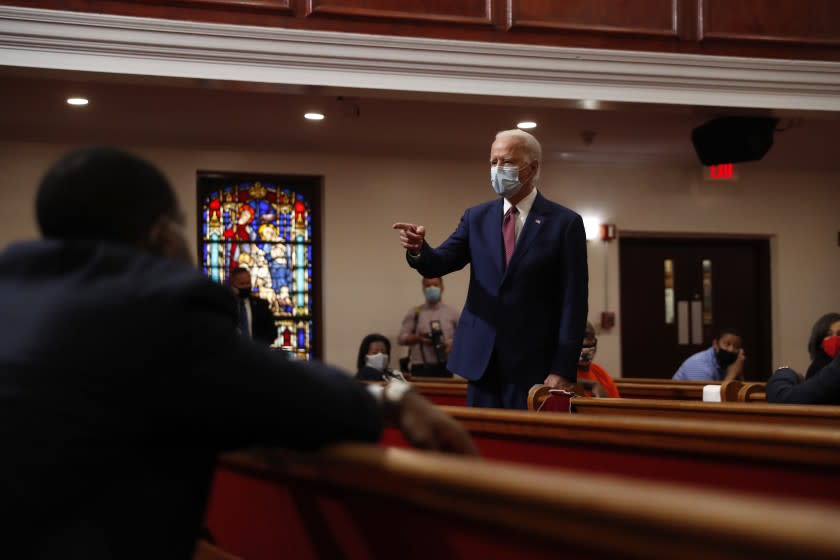Biden seeks to convey sense of leadership amid a national crisis

Joe Biden didn’t scold or lecture or lay blame for the unrest gripping America’s cities on the mayors who run them. But in an event Monday, he did offer the nation a glimpse at what things might look like inside the White House were he in charge.
There was diligent listening a lot of empathy, and some furious scribbling of notes as the former vice president dove into the policy weeds with Los Angeles Mayor Eric Garcetti and the leaders of Atlanta, Chicago and St. Paul, who joined him to discuss a response to the mass protests and violence set off by the killing last week of George Floyd in Minneapolis
The virtual roundtable was extraordinary in its ordinariness, an effort to offer a real time example of Biden’s signature campaign promise: a return to normalcy and collaboration.
It played out in sharp contrast to President Trump, who spent his morning berating the nation’s governors as “weak” and calling for protestors to be imprisoned for lengthy terms.
After a period of weeks when Trump commandeered media oxygen, using his White House briefings to take credit for taming a pandemic that has continued to rage, to excoriate China and to lambaste the World Health Organization, Trump has been absent from the public stage, leaving a void for Biden to fill.
The presumed Democratic nominee is taking the opportunity to stand in as healer-in-chief — a role for which Trump has shown little interest.
“I spoke to his family,” Biden said of his conversation with George Floyd’s relatives. “They weren’t looking for revenge. They were looking for justice, looking for finally saying this subject matters.”
Biden turned the virtual floor over to the mayors for the bulk of the meeting, but jumped back in repeatedly to sift through policy options with them on everything from the effectiveness of consent decrees for reforming police departments to the shortcomings of the federal recovery packages passed to address the pandemic’s economic fallout.
“We are no better than other places, but we went through this earlier than other places, a couple of times,” Garcetti said of the mass protests and violence triggered by police abuse. He lamented the sliding back of Obama-era policing reforms.
“We have national leadership that is pushing backwards to 20th century policing, when crime rates were higher and people were killed without a video camera to document it,” the mayor said. “You need a department of Justice that doesn’t walk away from consent decrees.”
Biden was talking to a friendly crowd, of course. These were Democratic big city mayors.
When the nation’s focus was entirely on the response to the virus, Biden’s ability to convene dialogues with such groups was consistently drowned out by the White House. Now, with the White House showing little interest in dialogue on racial issues, cities under curfew and National Guard trucks rumbling through the streets, Biden’s overtures are no longer drifting quite so much into the void of virtual campaigning.
Biden had his spiral notebook out earlier in the day Monday, as well, during a meeting of black community leaders at a Delaware church. It was his second venture out from the safety of his Wilmington home in two days, during which he talked of the ills of institutional racism and vowed to make confronting it a top priority in his first 100 days in office.
At the meeting with the mayors, Biden joined them in celebrating the many cases in recent days where police chiefs and rank and file officers joined in the protest of Floyd’s killing and found common ground with protestors.
“That to me is momentous,” said Chicago Mayor Lori Lightfoot. “And I don’t want to lose sight of that in in the context of the pain we are all feeling.”
The group talked in detail about what works and what doesn’t in policing. Garcetti shared Los Angeles' experience with racial sensitivity training. Atlanta Mayor Keisha Lance Bottoms talked about her city’s experience with a police force that is predominantly made up of African American men who “have the same cares and concerns that the rest of the community has when they take off their uniforms and when they send their kids out the door everyday.”
As looters destroy businesses already suffering from the pandemic’s economic collapse, the mayors expressed frustration at how little financial help Washington is offering to minority-owned businesses, even as it approved trillions of dollars of bailouts.
“To see the president of the United States say that he’s going to send the military into our communities but hasn’t mentioned sending a single dime of support in our communities speaks to where we are in America,” said Lance Bottoms.
Biden echoed the anger. “If one more dollar of any of this recovery money goes to a Fortune 500 company, it's wrong,” he said. “It should not be doing that.”
Biden closed the meeting with mayors making one last effort at burnishing his credentials as a listener and empathizer, apologizing for taking up the time of city leaders who need to get back to tending to a crisis.
“I know you all have got to get back to work,” he said. “But look, we have to build back better. We can’t build back to what we had before… There’s a lot I think we can do.”

